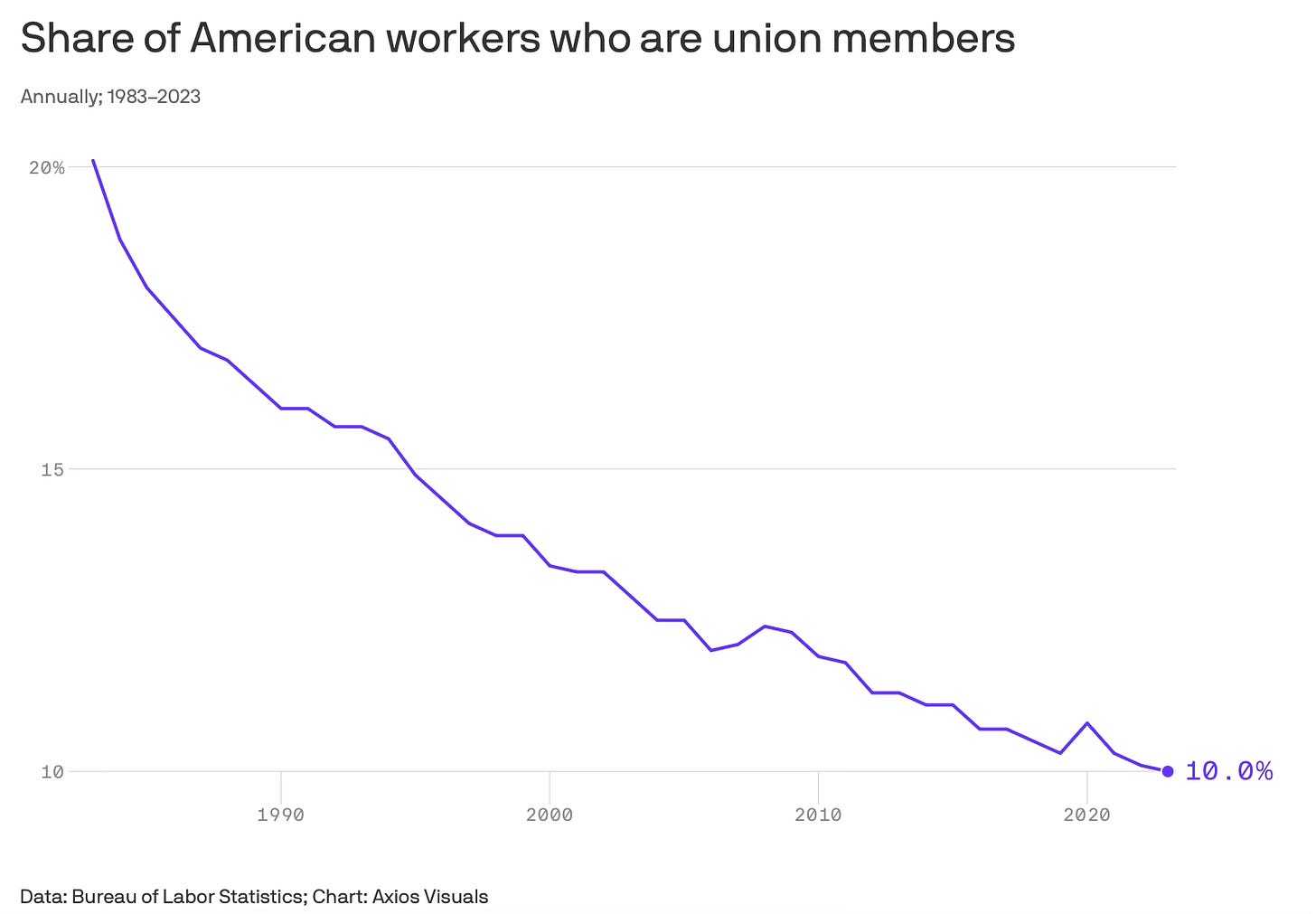Labor Day
Hello, I hope you are having a wonderful Labor Day weekend with friends and family. Summer is over and our kids are heading back to school.
I didn’t think about the meaning of Labor Day for most of my life; it was simply the last day of summer and a Monday off. But when you run for President, you start learning the meaning and history of various markers in American life.
Labor Day was originally a day of celebration championed by unions to recognize workers starting in the late 1800s. It was inaugurated as a federal holiday in 1894 after a major set of strikes – the Pullman Strike – shut down most train lines from the Midwest to the West Coast. The strikes involved 250,000 workers at their peak and resulted in the deaths of at least 30 people in riots in Chicago. Congress responded by making Labor Day a national holiday and giving all federal workers the day off.
That’s why we have Labor Day today.
For decades, unions were a massive force in both the American economy and politics. At their peak in 1954, 35% of working Americans belonged to a union. The United Automobile Workers was among the most influential, backing the 1963 March on Washington, the passage of Medicare and Medicaid, and the Civil Rights Act of 1964 among other accomplishments. In 1948, Walter Reuther, the head of the UAW, survived being shot at home and had his right arm rendered useless. The next year, his brother was shot at home and lost an eye. Things got that nasty. Neither shooting was ever solved.
Today, the percentage of American workers in a union is 9.9%, and despite well-reported exceptions to the contrary, organized labor has been diminishing for decades. A few sectors are highly unionized – teachers, airline workers, truckers, healthcare workers, postal workers, screen actors, police officers, firefighters – but most are not.
The vast majority of unions traditionally lined up with the Democratic Party as a way to influence policy. But their rank-and-file members have increasingly broken with leadership in terms of their individual votes due to cultural polarization; it’s tough to get a bunch of roughneck truckers to vote for Democrats who have taken on more and more of a coastal educated vibe, and a lot of union members like Trump. Just this month, the Teamsters started backing Republicans in swing districts, and it’s likely that other unions will follow suit. In a time of weakening institutions, it’s been hard for labor leaders to hold the line.
I posted on Twitter a few years ago, “Labor got 1 day, Capital got the other 364.” That seems about right. What happens when our labor becomes more and more irrelevant in an age of superintelligent machines?
Automation was one of the big points of contention in both the Hollywood writers’ strike and the dockworkers strike last year. 44% of American jobs are either repetitive cognitive or repetitive manual jobs and are thus potentially subject to automation. I talked to an insider at a major financial institution. He estimated that half of the bank’s workers would be gone in the next 3 years because of AI. The vast majority of workers do not have unions representing them. Of the 4 most numerous jobs that AI is set to replace – Customer service representatives, sales reps, marketing analysts and business analysts – none of them are unionized.
Who could be the Walter Reuther of today? Reuther put the UAW behind other causes that he saw as pro-worker. He helped found Earth Day as an example. But the footprint of labor has shrunken considerably and they will be hard-pressed to maintain the living standards and benefits of their membership, much less push for broader measures.
I spoke to a major tech entrepreneur last week. He said to me, “I fear AI will be the knockout blow to human labor.” I think he’s right. It’s been a long time coming. Our time and energy will become more and more marginal in this new era.
Perhaps the most effective response would be a movement of people advocating for a better way of life across sectors, classes and party lines. Could that come together? And what would it take to activate such a movement? Those are the next-generation labor questions of our time.
To see what Forward is doing in your area, click here. For me answering listener questions with Zach Graumann, click here. I’m working on something that will hopefully get more buying power into people’s hands. The next Offline Party is in New York on September 18th that will double as a launch party. Remember to look up and enjoy the long weekend.




Universal Basic Income is the dividend paid to all from the savings of automation, now simply referred to as AI because AI has so expanded the jobs that can be automated. BTW the company that keeps informed customer service people will draw customers galore unless the AI improves dramatically. UBI as an anti crime tool needs your push and insight. see the chapter on UBI in "The Price Of Eggs Is Down" 4th edition on Amazon Kindle or paperback. We need to move the 1/3 of people who don't give a damn about others into the 2/3 who do and self govern. Love, Doc www.dykers.com